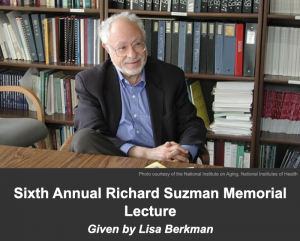- Lisa Berkman (Harvard School of Public Health, Harvard Center for Population and Development Studies (HCPDS))
a Seminar
Wednesday, 07/08/2020, 2:10 pm. ARCHIVED EVENT
Location: virtual
Featured Speaker
Lisa Berkman
Director, Harvard Center for Population and Development Studies (HCPDS) and Thomas D. Cabot Professor of Public Policy and of Epidemiology at the Harvard T.H. Chan School of Public Health
Topic
Work as a Social Determinant of Health and Aging
The workplace is a major institution that shapes the health and wellbeing of men and women over the life course. Both entry and exit from the labor force form one important dimension of the role of labor force participation and the policies and conditions at the workplace form another critical domain. Both domains are central to the development of healthy aging and longevity. The Coronavirus pandemic has amplified the critical nature of work and its importance to older people-it has revealed the racial, ethnic and economic cleavages already evident in the country as well as focused attention on the particular vulnerability of the elderly, especially frail elderly. In this presentation, we will discuss workplace issues in the face of COVID and the implications for racial and ethnic disparities in longevity. A second aim is to present the evidence that social and organizational workplace conditions impact healthy aging. We highlight the importance of changing workplace conditions themselves and not adding “wellness” programs in workplaces with toxic work conditions. The third aim is to discuss the ways in which “working longer” and remaining in the labor force may or may not improve the lives of older men and women and serve to increase growing economic and health inequities.
About the Richard Suzman Memorial Lecture Series
Dr. Richard Suzman was Director of the Behavioral and Social Research Division at the National Institute on Aging for almost two decades. His key achievement was the establishment of the Health and Retirement Study, which has grown to encompass a group of connected international surveys that cover more than half the world’s population. He fostered an intellectual environment in which top scholars from different disciplines collaborated with each other to provide insights into population aging around the world. The science of behavioral and social research on aging is fundamentally different today because of his contributions and influence. It is fitting to have a memorial lecture in his honor at the RAND Summer Institute because of his unwavering support of RSI, and especially his early insistence that it should include both social and medical research.

